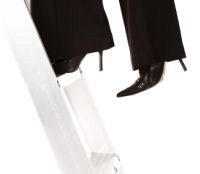

It has been suggested this month, that employers should carry out risk assessments for women working in high-heeled shoes because they create a health and safety hazard, according to a motion passed at the TUC's annual congress in Liverpool. Delegates have also debated the practicality of wearing heels and the resulting health problems associated with stilettos, such as knee and back pain. The vast majority voted in favour of a motion which read, "High heels may look glamorous on the Hollywood catwalks but are completely inappropriate for the day-to-day working environment."
Research on employers' dress codes, conducted by the TUC for its guide "Working Feet and Footwear", found that some upmarket shops, airlines and City financial institutions insist on women wearing high heels to work. But the TUC says employers should allow women to wear "sensible" shoes. Commenting on the debate, Lorraine Jones from the Society of Chiropodists and Podiatrists pointed out wearing high shoes puts seven times as much pressure on the ball of the foot as flat shoes. "This is not a trivial problem. Two million working days are lost every year through lower limb and foot-related problems. We are not trying to ban high heels - they are good for glamming up but they are not good for the workplace. Women should have the choice of wearing healthier more comfortable shoes."
Though the motion received general consensus at the congress, Lorraine Monk from the University and College Union (UCU) opposed it, warning the unions would be painted as fashion killjoys in the press. "We should list all inappropriate dress in the workplace, not pick on something that is symbolic of a much wider debate about gender roles and is something that many women have a particular view about - both for and against."
Other health and safety motions which were debated at the congress included working temperatures, pleural plaques and North Sea safety.